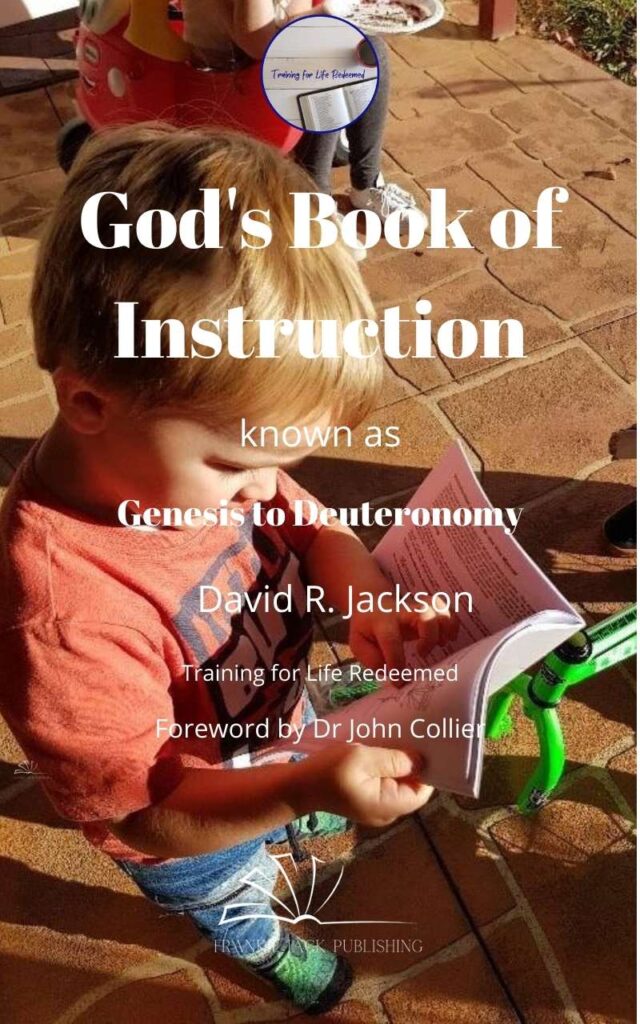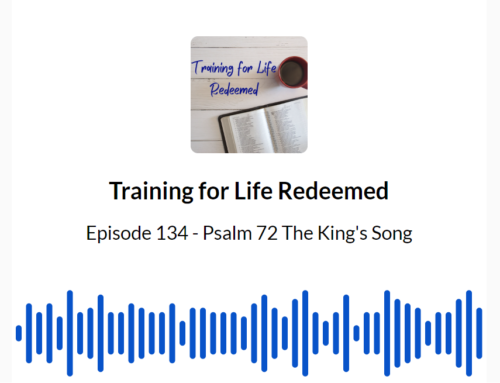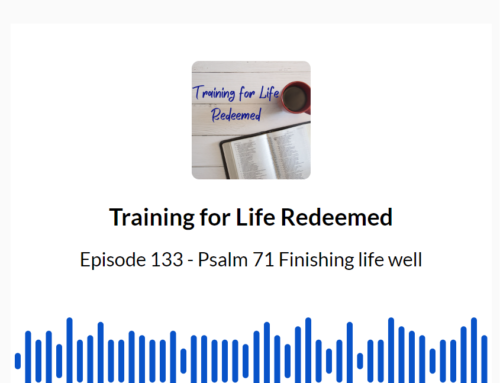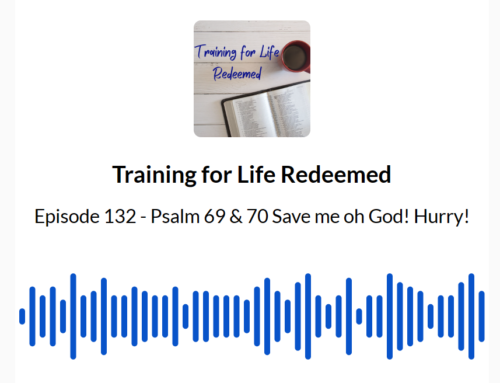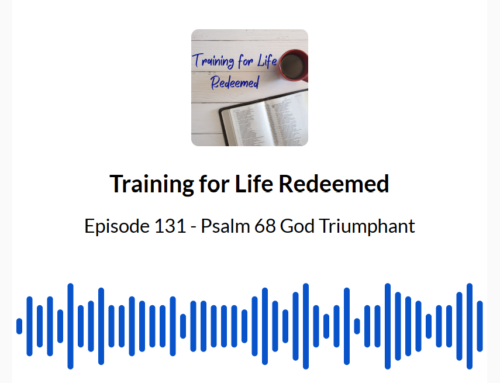Grab your notes for this episode by completing the form
and we will send you the link to all our notes.
Get the book “God’s Book of Instruction” on Amazon.
The first five books of the Old Testament constitute God’s book of instructions for his redeemed people. It reveals the character of God and his good design for life. It bears witness to the beginning of his work of redemption. It equips the believer to live in God’s world, God’s way, as God’s image for God’s glory. What sin and death have broken, God’s people can rebuild by keeping to his instructions by the power of his presence with us.
Transcript
Dan: (00:00)
Well, hi and welcome to training for life redeemed. I am Dan and each week I am sitting down with my dad, Dr. David Jackson, to examine various sections of the Bible. Now this week, we are going to look at Genesis chapter one, verse one to chapter two, verse three, which is all about the beginnings. And it’s the very beginning.
Dan: (00:38)
So let’s start with the first four words of the Bible “in the beginning, God.” So how does that set us up for what’s coming?
David: (00:48)
Uh, those four words, blow everything we might think right out of the water. And it’s shocking stuff. The concept that there is a beginning is in itself blows the mind. Notice it doesn’t say before the beginning, because, if there’s a beginning, you can’t have it before this verse telling us that God created time and space, not just the stuff that he put in it, it tells us that God himself exists outside of the whole creation order. Unlike every other God, anybody else imagined. And sometimes the way people imagine God himself. He’s outside of time, outside of space, outside of the whole creation, he’s uncreated. He doesn’t exist within the rules and the regulations and the, the limitations of space and time. We’re dealing with the creator who is not part of the creation.
Dan: (01:59)
All right. So that’s Genesis 1:1. When we get to Genesis one, two, it starts to kind of set us up on the six day journey as God goes through and creates the world. And there’s this beautiful structure that flows through it of, you know, and God said, whatever he says, it happens. It was beautiful. It was good. And then there’s evening and morning. And then it’s either, whatever day is, is finishing, is this poetic? Is this just structure? What, what’s the point of this? Why is it put in the Bible like that?
David: (02:28)
Well, a couple of answers, clearly this is narrative and narrative isn’t fiction. Narrative is this is historical narrative and he just flows on telling the story from Genesis 1:1 right through till the middle of Exodus and on. So we’re dealing with a sequence of events, six days worth of events in a, in a first, second, third order sequence. The days are defined as evening and morning, not as indiscriminate ages. And this tells us that we’re dealing with a God of order of deliberation, a God who creates by his word. And it also tells us that we’ve got a basis on which to go investigate all of this. Um, so when this stuff was written, it was written for an audience that didn’t have their own copies sitting on their lap in church. This is a book that has been read to a congregation and whenever Moses writes anything, he repeats himself over and over and over again in a pattern so that if you’ve listened to him for 20 minutes, you virtually memorized all, but fill in the blanks.
David: (03:43)
And that’s a very effective way to teach. People have some problems with this, with their science and those problems are real. And we need to stop telling ourselves that the Bible isn’t a scientific textbook, the Bible is telling the story. It is God’s story. And it’s true. Our science is observing what we can see today. This is what God is describing as what he did, then. What we see today, doesn’t match with what he tells us he did then. That’s a fact, what do you do with that? My answer is we humbly sit down and say, there’s lots of stuff in the science that we can see helps us understand the Bible. There’s lots of stuff in the Bible that makes us rethink our science and where the two clash. I don’t want to sit down humbly and say, I don’t know the answer, but let’s go have fun and explore. Let’s research your Bible, let’s research, our science. Let’s not make up answers that are easier, that cancel one or the other. The Bible is telling us God’s story and that’s the way he did it. And in our science, that’s not exactly something you can easily investigate, but we have investigated stuff and we need to take that seriously too. This isn’t a choice. This is an invitation to explore, to learn and to discover. And it’s brilliantly exciting.
Dan: (05:19)
Genesis 1:1 all the way through to 2:3 essentially walks us through the seven days of creation. So that the six days of actually creating, and then not the seventh day, he just tells us that he stopped. So how does that whole seven day sequence then point us to Jesus? Because we said in our very first episode, that when we’re looking at the old Testament, we have to look at how Jesus fulfills it. We have to look at how it shows us God and how it teaches us to live a life redeemed. So how does it point towards Jesus?
David: (05:52)
I think we, we really come to the first thing you discover is that Jesus is the creator God. So when it says in the beginning, God, John 1:1 opens up and says in the beginning was the word. The word was with God. The word was God. And the word became flesh. So this word, this God is Jesus. So immediately we’re confronted with a God who is way more complex than some monistic individual like us, sitting in the sky, chucking stuff around. Um, when the Bible says, God is love. If in the beginning there was only God, who did he love? And the answer is you have father, son and Holy Spirit. we learn that as we go along. So we’re immediately confronted with Jesus second person of the Trinity. Um, and when we come to Genesis 1: 26 to 28 and God starts talking to himself and the Father, Son and Holy Spirit having a conversation, let’s go down there and let’s make human beings in our image.
David: (06:58)
They’re going to reflect that character. They’re going to be a visual representation of who we are as the one, God. that’s a complex creation. So when he creates an image of himself, he creates a man and a woman that immediately confronts every aspect of our culture and every culture man, and woman, are each image of God together, they image God, they’re designed to function together. Uh, this thing is like a finely tuned, set of relationships. And then he blesses them. I think we miss this sometimes. He gives them three blessings, three happinesses having kids, work, and being in control of their world under God. That’s I mean, if you, successful in terms of your family, if you are successful in your work and if you are successful in terms of having control of your world, that’s the place that the Bible calls, Shalom peace, and God gave us that from the beginning as a blessing.
David: (08:17)
And he enabled us to do that. When I wrestled with high school kids, you notice that these kids go into crisis in the early years of high school. Am I any good with the opposite sex? Or am I a complete dork or the girls would tell each other you’re a dog. These are hugely destructive. God says, we’re very beautiful. Am I competent? Or am I a useless lump of meat? Am I in control of my world? Or am I a victim? You look at how God handed us this beautiful package and how we screwed it up and had Jesus gives it back to us. And that’s huge.
Dan: (09:01)
Yeah. And I like, you know, I remember doing a paper when I was Bible college on Colossians and I liked how, as I was reading the commentaries and stuff and writing this, it was really clear in the passage that in Genesis one that talks about how Adam and Eve were created in God’s image. Whereas in Colossians it’s about God, about Jesus being the image rather than being created in the image, which I think is, is really making clear to us that Jesus is, he’s God. When you look at him, you see, you’re seeing God, you’re not just seeing something that looks like God, you are actually seeing the image of God.
David: (09:38)
You’re you’re encountering God himself, visibly manifest in the flesh. Whereas we are a picture. We’re derivative. So if I take a photograph of Dan and I put that photograph up the photograph, I might look at it and say, there’s Dan. But if I start talking to the photograph, I’m a twit, okay, this is not Dan. This is a two dimensional representation. When you go from the creator God, to us, you’re going from the giver of life to a living, being manifesting in more than just a visual in every aspect of our life and story, the character of God.
Dan: (10:21)
So my last question I have down here to ask you is what does this passage say about God? And I think we’ve already talked about it. It’s already identified that God is three. So the Trilogy’s in there. We’ve talked about how his love, we’ve talked about how he is the giver of life is anything else that we can pull out of this passage about who God is and what he’s like?
David: (10:44)
I think one of the things that we noted in this whole business is that this is about glorifying God. Many years ago, when my dad was around, we and I do this with my sons, from time to time, we’ll get stuck into a job in the middle of the day, we’ll work our guts out, getting the wall built or whatever it is. And at the end of the day, you sit down and in my dad’s case, it was usually about midnight. When you’d finally finished, the job and dinner was cold and Mum re-heated it. And we’d sit down and edit it a smoke, and we’d look at the wall and we’d go, yeah, that’s pretty beautiful. That’s good. I’m satisfied with my work. And you look at this whole seven day creation. You go here is God, Father, Son, Holy Spirit, looking at his work at the end of each day, going, yeah, that’s beautiful. And you start to get the idea, why am I here? To glorify God and enjoy him forever? And he’s created this whole story to do that. Life isn’t pointless.
Dan: (11:48)
No. So then if we switch then for what it tells us about God and what it’s, how it’s pointing us towards Jesus, to the let’s focus in more on us. How does this actually train us for a redeemed life? How, how does this teach us how we should be living?
David: (12:03)
It says to me, I need to go back to Eden and I need to think about how God set it up to work and know that where we’ve deviated from that the word for sin, it means that you’ve stepped off the path. That Hebrew word is a word for missing the target, uh, losing your way on the, on the map, getting off the trail and ending up lost in the Bush. That’s what we’ve done. So what we need to do is go back to the place where we started and look at how God mapped it out for us. This is the good life, and this is the life Jesus died to give us back so that we can not only get to heaven and enjoy it, or get to the new creation, enjoy it, but start to put the pieces back together now and rebuild our own little Eden, here and now in our communities.
Dan: (12:56)
Well, that’s it for Genesis chapter one, verse one to two, verse three. Thanks for listening. If you want to go and have a look at the show notes or get a copy of the section from David’s little miniseries that talks about Genesis 1:1 to 2:3, jump over to trainingforliferedeemed.com/e P to leave us a comment or ask us a question that you would like to have answered on this podcast. And we will have a look at those and answer them as we go. Now, if you enjoyed today, please take a moment and leave us a review and make sure that you tune in next week. When we talk all about Genesis two,
